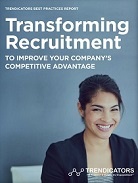
Artificial Intelligence (AI) is transforming how organizations deliver products and services, manage customer experiences and orchestrate operations.
Early versions (1990s) of AI in applicant tracking systems (ATS) were used in keyword matching to help recruiters sift through large volumes of applications. As computational processing power improved exponentially one decade later, machine learning algorithms and natural language processing led to predictive analytics for candidate assessment and sentiment analysis, enabling recruiters to gain deeper insights into candidates’ personalities and cultural fits.
Today, AI in recruitment involves the application of artificial intelligence and machine learning algorithms to automate and improve recruiting functions—from candidate sourcing and assessment to candidate engagement, interviewing and hiring decision support.
Below is an overview of our recent eBook, The HR Leader’s Guide to Using AI in Recruiting:
Today, chatbots, virtual assistants and sourcing platforms are becoming increasingly prevalent in the early stages of the recruitment process. These AI tools can answer common queries from candidates, schedule interviews, help identify new candidate pools and automate other tasks to increase efficiency and optimize resources in talent acquisition. When held to well-established standards for ensuring fairness in HR processes, these tools can also help to standardize interviewing and selection processes to minimize bias and increase diversity. This, however, will require greater levels of transparency from AI solution providers than exists today.
While most employers are still evaluating the use of AI in recruiting processes, AI adoption is expected to increase significantly over the next several years as recruiting teams gain a better understanding of how AI can be leveraged to improve recruiting efficiency and effectiveness. According to MMR, a market research firm serving Fortune 500 companies, the AI recruitment market, valued at $661M in 2023, is estimated to reach $1.1B by 2030, exhibiting a robust CAGR of 6.8% over the forecast period.
How are industry-leading brands using AI in recruiting? Based on a report published by skills assessment provider WeCP, several companies (Amazon, Unilever and Delta) reveal the use of AI to streamline recruitment processes, facilitate good candidate experiences and improve skill matching with open opportunities. The degree to which companies report the use of AI on career websites varies and is sometimes included in FAQs.
While the U.S. has no federal regulations in place, states and municipalities are quickly moving to enact legislation that affects employers and software vendors. Currently, 16 states have legislated and passed AI regulations. Over the past year, state-level AI-related bills have increased by 1,600% and now exceed 400 in number. Navigating these complex requirements is even more difficult for companies operating internationally.
We found that many candidates are skeptical about using AI in recruitment and hiring processes. People do not trust what they do not understand. In reviewing the results of surveys about perceptions of AI in hiring, it is important to distinguish between those that assess general perceptions and those that assess perceptions based on the actual use of AI in hiring processes.
To read more on this topic, download our The HR Leader’s Guide to Using AI in Recruiting eBook below!



